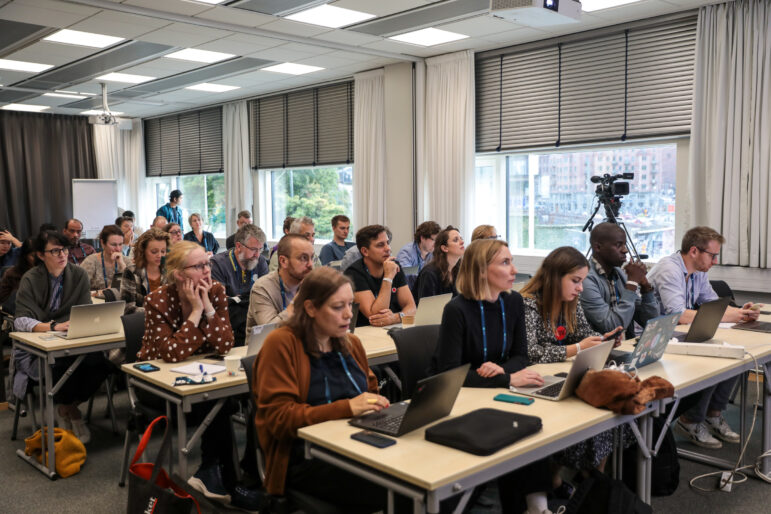

Data Journalism Top 10: Apartheid Architecture, Night Trains, Conflict Reporting, LGBTQ & Refugee Vaccines
Read this article in
Would you board a night train instead of a plane in order to help protect the environment? European policymakers hope more and more citizens will do so. Our NodeXL #ddj mapping from May 3 to 9, which tracks the week’s most popular data journalism stories on Twitter, found an article by Bloomberg analyzing a plan to drastically cut greenhouse gas emissions by rolling out more cross-border rail lines. In this edition, we also feature a multimedia project looking at an architectural phenomenon linked to apartheid in South Africa, a Washington Post story about the true toll of the coronavirus pandemic in Mexico City, and a guide to using data in conflict reporting.
The Architecture of Apartheid
During South Africa’s apartheid era, hostels were built to house Black laborers working in the diamond and gold mines. With their gigantic symmetrical structure, these buildings were designed to symbolize and enforce total control. But the hostels remain places of home and work for many South Africans, decades after democracy was established. A multimedia data-driven project published in South Africa’s Daily Maverick examines this architectural phenomenon and its place in South African history.
Mapping Makoko
Over 300,000 people are estimated to live in Makoko, one of Africa’s most unusual inner-city slums. But for years the settlement in Lagos, Nigeria, would have been difficult to find on most maps, appearing as a near-blank space. This information gap inspired Mapping Makoko, a Pulitzer Center-supported project that combines data, satellite imagery, field reporting, and long-form storytelling. In a Twitter thread, Code For Africa shared some of the stories from the project so far.
Night Trains
Europe is trying to cut greenhouse gases from airplanes. But in a region where international travel is so widespread, finding an alternative, eco-friendly mode of transport is a major challenge. Part of the solution could be night trains, which take significantly longer than air travel but generate a fraction of the emissions. Bloomberg analyzed Eurostat data to show which nations use rail the most and explained the long-term plan to roll out more cross-border lines.
Germany’s Climate Goal
German politicians have set out plans to make the country carbon neutral by 2045, instead of the previous target of 2050. A proposal presented last week also called for emissions to fall 65% by 2030 in comparison to their 1990 levels, a more ambitious goal than the previous 55%. But how can Germany achieve these targets? A data-driven analysis in the newspaper Zeit examines the possibilities.
Vaccines Are Winning
A resurgence of the coronavirus in countries like Chile and Canada has caused concerns in some quarters over the efficacy of vaccines. But the Financial Times’ data journalist John Burn-Murdoch broke down the data coming out of those countries to show that despite the rising cases, immunization campaigns are saving lives.
The Cost of Invisibility
LGBTQ people in the United States are more likely to face hurdles accessing health care, according to national surveys and studies. But local authorities rarely collect sexual orientation or gender identity data, making some anxious that they could have trouble getting vaccinated. This New York Times’ story explains why missing data could deepen existing inequalities with regard to the COVID-19 vaccine roll-out.
Refugees and the COVID-19 Shot
At least 46 million people around the globe have been excluded from national COVID-19 vaccination programs, according to World Health Organization data cited by The Guardian. Affected groups include asylum seekers, migrants, refugees, and internally displaced people. Experts worry that if large parts of the global population struggle to get access to vaccines, they would be left unprotected and vulnerable, potentially triggering more virus outbreaks in the future.
Mexico City’s COVID-19 Shortfall
Early on in the pandemic, hospitals in Mexico City were filled with patients suffering from the coronavirus, but the official death count appeared suspiciously low. This Washington Post story chronicles how two citizen sleuths — economic consultant Laurianne Despeghel and software developer Mario Romero Zavala — set out to discover the pandemic’s true toll.
Conflict Reporting, with Data
Data journalism is an essential part of covering conflicts in the Middle East, Africa, and elsewhere, but finding quality data on affected regions can be challenging. On World Press Freedom Day, DataJournalism.com published an in-depth piece helping reporters identify the right datasets, evaluate sources, and translate statistics into a meaningful narrative on the impact of war and conflict.
New Data Journalism Podcast
Two renowned data journalists, Simon Rogers and Alberto Cairo, have started a new podcast dedicated to data-driven storytelling. The series explores the latest trends and developments in the field and will feature conversations with other accomplished data journalists. You can listen on Anchor, Spotify, and other platforms.
Thanks again to Marc Smith and Harald Meier of Connected Action for gathering the links and graphing them. The Top Ten #ddj list is curated weekly.
 Peter Georgiev is GIJN’s social media and engagement editor. Previously, he was part of NBC News’ investigative unit in New York. He also worked as a correspondent for Bulgarian National Television and his reporting has been published by the Guardian, Deutsche Welle, and other international outlets.
Peter Georgiev is GIJN’s social media and engagement editor. Previously, he was part of NBC News’ investigative unit in New York. He also worked as a correspondent for Bulgarian National Television and his reporting has been published by the Guardian, Deutsche Welle, and other international outlets.









